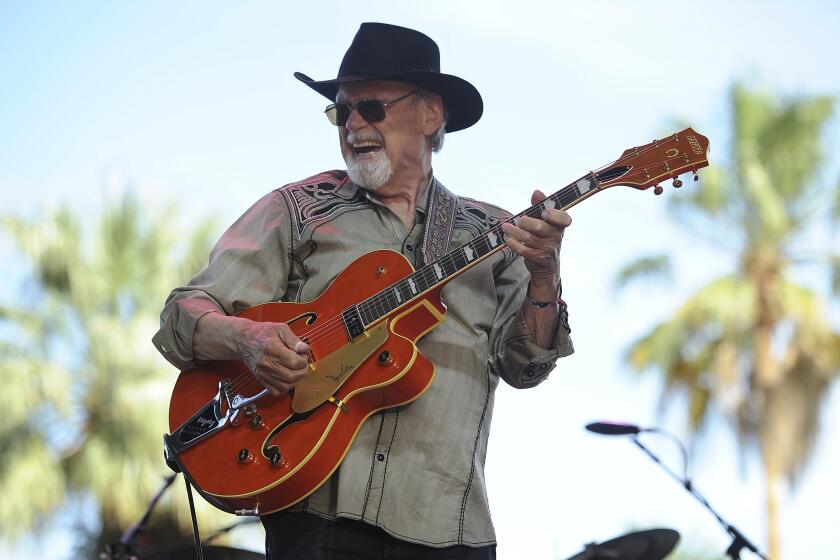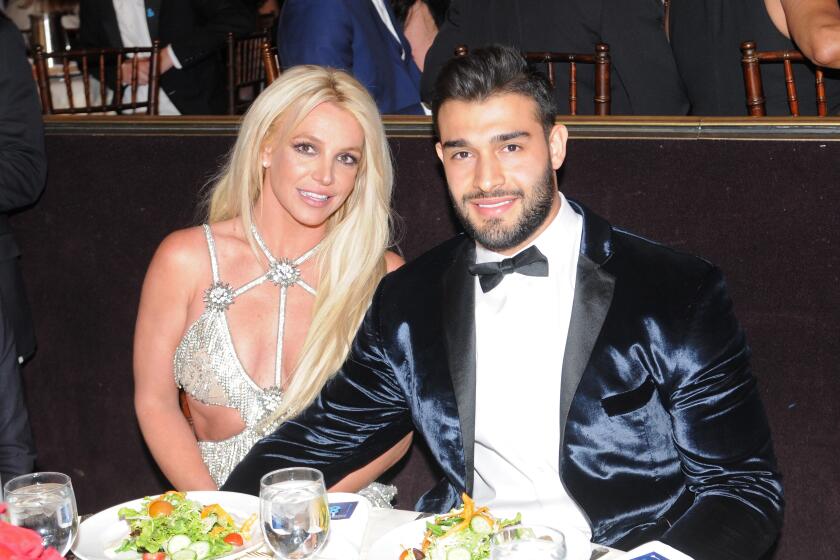Opportunity Knocking
A strange tension gripped the California Speedway in Fontana on Friday night as the Doors, circa 2002, took the stage. Striding up to the microphone in black jeans, cowboy boots and lace-up blouse shirt was not Jim Morrison but his doppelganger, British rocker Ian Astbury, complete with a head of natural black curls.
As original keyboard player Ray Manzarek and guitarist Robbie Krieger stepped up to a roar of approval from the 5,000 bikers and classic-rock fans gathered in the dusty infield for a concert celebrating the 100th anniversary of Harley Davidson, the legacy of the Doors hung for a moment in the balance.
When they last left the stage at the Hollywood Bowl on Sept 10, 1972, almost 30 years ago to the day, Manzarek said, “Next time we’ll be back with Jim” --meaning they’d never be back (Morrison died in 1971). So the songs have remained as they were then, unsullied museum pieces of FM rock radio, perfect, the past. But as Krieger laid into the loping opening riff to “Roadhouse Blues,” it suddenly seemed that the band’s risky endeavor could work: there could be a new Doors. Astbury’s rich baritone picked up the verse with Morrison’s inflections--”Keep your eyes on the road, your hands upon the wheel”--and the crowd began to roar.
Yes, it was the Doors’ greatest hits, with all that that implies. But it was more too. It wasn’t Morrison, it wasn’t a tribute act, it was Astbury revealing that the familiar songs --”L.A. Woman,” “Break On Through (to the Other Side),” “Five to One”-- held new potential.
Manzarek, visibly moved by what was happening before him, couldn’t help but shout out what he’d been waiting 30 years to say: “Ladies and Gentlemen, this is the Doors! We’re here to witness the new Doors for the 21st century.”
Whether the rock audiences, young or old, will accept a new Doors is a major question. It’s not, for instance, likely to be embraced by either radio or MTV, and none of the four principals--including ex-Police drummer Stuart Copeland--have been involved in high-profile rock projects for years.
Manzarek and Krieger are comfortable in using the Doors’ name again. Not as a nostalgia act, not playing the rock revival circuit, but to step into a spiritual leadership void that has haunted rock music since at least the mid-’90s with the demise of Nirvana and the movement of rap toward R&B;, which has become acute in post-Sept. 11 America.
“It’s kind of comin’ back around to how it used to be,” said Krieger, 56, sitting in the lounge of a rehearsal studio in Hollywood last week. “In the ‘60s we had the Vietnam War, and now we have the war with Iraq and terrorism.”
“So we’re going to offer Doors passion and Doors spirituality to a new generation,” said Manzarek, 63, breaking in with his rapid-fire, youthful enthusiasm, “that looks like right about now could really use a dose of truth and reality and making music just for the sheer love of making music.”
During an afternoon in the cool dark of the black-walled rehearsal studio, with Stone Temple Pilots thundering in the next room, it became clear just exactly how the original members of the Doors see themselves having an impact. The revolutionary aspects of the ‘60s, for instance, the civil rights and anti-Vietnam War movements, are still largely communicated through the music of the time. The Doors albums from 1966 to ’71 did not shy away from the bloody, menacing news of those days, but transformed them truthfully with the poetic and theatrical sensibility of “The End” or “When the Music’s Over.”
“There’s a spiritual crisis in light of what happened last year,” said Astbury, 40, his intense eyes almost mocking his Mickey Mouse T-shirt, his light English accent deepened by hours of singing.
“Right now, we seem to be in this void where there’s no real patriarchal figures that we can depend upon,” he said. “I think Morrison was a great, strong model for masculinity--how to carry yourself without being phony baloney and hippie about it.”
While Astbury and his hard-rock stance with the British band the Cult might seem like a strange fit for the Doors, he suits the combination of romantic poet and spiritual warrior that drove the original band members. Manzarek and Krieger, who met drummer John Densmore when all three were part of the original Transcendental Meditation group of the Maharishi Mahesh Yogi in 1965 (later popularized by the Beatles), are committed to preserving the shamanistic and poetic tradition embraced by Morrison.
“I read principally because of Morrison,” said Astbury. “I studied native cultures because of Morrison, I went to Tibet because I was introduced to indigenous and shamanistic cultures through the Doors’ work. Even when I was a longhaired rock guy, I’ve constantly pushed Native American philosophy, indigenous philosophies, Buddhist philosophies.”
Now it looks as if the new Doors will give him the opportunity to write new lyrics as well. After a bit of touring, Manzarek and Krieger plan to work on the first new Doors material since 1978’s “American Prayer,” which featured Morrison vocals and poems recorded before his death. Krieger says they’ve been writing for six months, the first time they’ve written together in decades, and have eight to 10 new songs. The core band will be the one that appeared in Fontana: Manzarek, Krieger, Astbury, explosive drummer Copeland and young bassist Angelo Barbera. Densmore may work on the project if his current bout of tinnitus, a ringing in the ears common to rock musicians, improves.
They’ll also be be working with other poets such as musician-actor John Doe of the seminal Los Angeles rock band X and “Basketball Diaries” author Jim Carroll, whose 1980 rock album “Catholic Boy” remains a touchstone of urban punk poetry.
Doe came out at Fontana to read “Ghost Song,” Morrison’s poem about an apparent car accident that killed a group of native Americans, later immortalized in Oliver Stone’s film “The Doors” as a formative experience in Morrison’s artistic life.
Copeland, whose virtuoso drumming pushed the old songs toward a new aggression, says his new role couldn’t have been more natural. “I already knew all the songs,” he said with a laugh. “I used to play Doors songs when I was 14 years old in a cover band in Beirut. These are such great songs, so well structured, I haven’t had this much fun since the Police.”
For Danny Sugarman, the Doors’ longtime manager, the new Doors are the culmination of a long struggle. Standing backstage, he said, “I’ve been trying to make this happen with Ian for 10 years.”
The only Doors song they won’t do, say Manzarek and Krieger, is “The End.” That song was Jim’s. Everything else is being put back in the lineup, and they’re finding the old feelings are flooding back.
“I don’t think it’s any different 30 years ago than it is today,” said Manzarek. “Human beings are sentient, they want to be hit in the loins with a good beat, and they want to stimulate their brain, and they want to feel their heart chakra just pumping love. We all want exactly the same thing: We want to get off. We want to rock.”
More to Read
The biggest entertainment stories
Get our big stories about Hollywood, film, television, music, arts, culture and more right in your inbox as soon as they publish.
You may occasionally receive promotional content from the Los Angeles Times.






